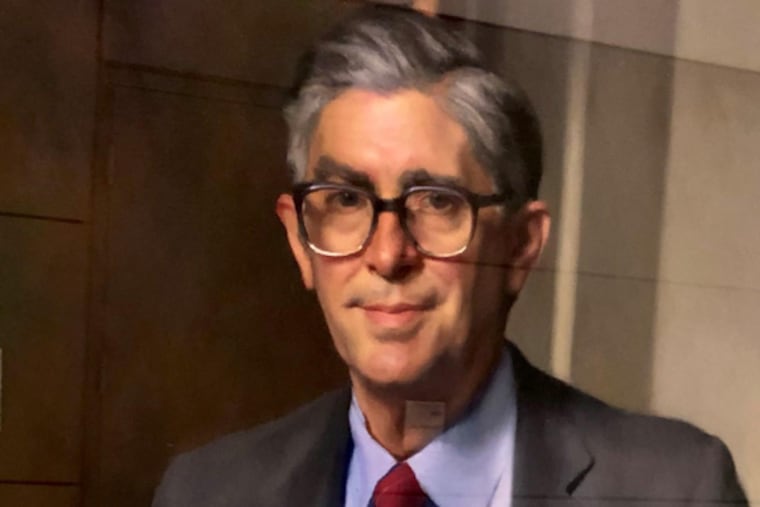Edward J. Stemmler, dean emeritus of Penn school of medicine, chief administrator, professor, and veteran, has died at 93
He will be remembered, a colleague said, for "his passion for upholding excellence in education and training. His impact on medical education is profound and enduring."

Edward J. Stemmler, 93, formerly of Philadelphia, dean emeritus of the Perelman School of Medicine at the University of Pennsylvania, former executive vice president of the school’s medical center, retired professor of medicine, chief administrator at Penn and other organizations, trustee emeritus, board member, mentor, and veteran, died Tuesday, Jan. 3, of cardiac arrest at the Kendal at Longwood retirement community in Kennett Square.
Dr. Stemmler became an instructor at Penn’s medical school in 1964 and retired in 1994 as executive vice president of the Washington-based Association of American Medical Colleges. In between, he was Penn’s first Robert G. Dunlop endowed professor of medicine from 1981 to 1988, dean of Penn’s medical school from 1975 to 1988, and executive vice president of the Penn medical center from 1986 to 1989.
He was named dean emeritus in 1989 and, upon his retirement from Penn in 1990, the school’s medical education building near 33rd and Spruce Streets was renamed Edward J. Stemmler Hall. “He promoted a caring approach to the educational process,” a former Penn colleague said in an online tribute. “He demonstrated by deed that kindness yielded great rewards.”
His family said Dr. Stemmler “was an advocate for the freedom of education and the preservation of academic values in an era of the commercialization of medicine. His ethical and humble approach to life permeated his interactions with others.”
As dean of Penn’s medical school, Dr. Stemmler instituted innovative academic and administrative procedures, championed biomedical research, and added or improved many facilities across the campus. He received lifetime achievement and distinguished graduate awards from Penn’s school of medicine and focused much of his tenure on making medical careers more appealing.
“American youth is paying attention to life values outside the workplace,” he wrote in a 1987 editorial for The Inquirer. “The desire to attend to family and social life has fostered the growth of group practices to lighten excessive workloads. Medical educators must recognize such trends and consider adaptions in educational programs that are sensitive to them.”
He also served in the 1960s as a department chief at the Hospital of the University of Pennsylvania and the city’s Veterans Administration Medical Center. In the early 1970s, he was associate dean for the hospital and later for student affairs.
Away from Penn, Dr. Stemmler was past president of the American Clinical and Climatological Association and treasurer emeritus of the American College of Physicians. He was trustee emeritus at Ursinus College and served on more than a dozen boards and advisory committees.
He earned lifetime distinguished service awards from the Association of American Medical Colleges and the National Board of Medical Examiners, and the NBME renamed its medical education research fund the Edward J. Stemmler fund in 2000.
Former students and colleagues flooded an online tribute with memories that characterized Dr. Stemmler as a ”special gentleman” and “role model,” and saluted his “rich life of service” and “legacy to be proud of.” One former student concluded: “He was a wonderful example of what a physician should be.”
Born Feb. 15, 1929, Edward Joseph Stemmler grew up in Northeast Philadelphia and graduated from La Salle College High School. He earned a bachelor’s degree at La Salle College, now La Salle University, in 1950, was drafted, and became a decorated Army sergeant first class in a chemical corps intelligence unit in Korea in 1952.
He worked as an auto parts salesman after the Army, got accepted to Penn’s school of medicine in 1956, and graduated in 1960. He completed his internship, residency, and two fellowships at Penn, and was promoted from instructor to professor in 1974.
He met Penn student Joan Koster on a blind date, and they married in 1958. They had daughters Beth, Peggy, Cathy, and Joan, and son Ed, and lived in Yeadon and Merion. They moved to Georgetown in the 1990s when he worked for the Association of American Medical Colleges in Washington and later lived in Virginia. They relocated to Kendal in 2012.
His family described Dr. Stemmler as “a gadget guy, handyman, lover of jokes, cinephile, reader of biographies, and physician with a concern and love for people.” He liked to fish in New Hampshire, walk in the Virginia woods, and knock out the New York Times crossword puzzle with his wife.
He followed the Eagles, played tennis, and died in his wife’s arms. “He always said he was just a kid from Northeast Philly who got lucky,” said his daughter Cathy. “But he made such an impact on people. He loved his work, and he loved his family. People felt heard by him.”
In addition to his wife and children, Dr. Stemmler is survived by five grandsons and other relatives. Two sisters and a brother died earlier.
A celebration of his life was held Feb. 11.
Donations in his name may be made to the Residents or Staff Assistance Funds at Kendal Crosslands Communities, P.O. Box 100, Kennett Square, Pa. 19348, and the Joan K. Stemmler and Edward J. Stemmler Endowed Scholarship at the University of Pennsylvania, Attn: Laura Weber, 3600 Market St., Suite 300, Philadelphia, Pa. 19104.